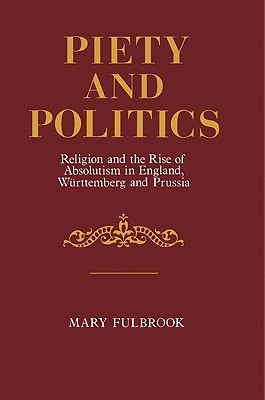
- We will send in 10–14 business days.
- Author: Mary Fulbrook
- Publisher: Cambridge University Press
- ISBN-10: 0521276330
- ISBN-13: 9780521276337
- Format: 15.2 x 22.9 x 1.3 cm, minkšti viršeliai
- Language: English
- SAVE -10% with code: EXTRA
Reviews
Description
In the context of continuing debates over Protestantism, capitalism and the absolutist state, this book presents a fresh historical and theoretical analysis of religion and politics in early modern Europe. The author undertakes a systematic comparative-historical analysis of the very different contributions made by the Puritan and Pietist movements to the success or failure of absolutist rule in England, Württemberg and Prussia. While Puritans and Pietists shared similar religious ideas, aspirations and ethos, they developed quite different political attitudes and alliances in each case. English Puritans made a crucial contribution to the overthrow of attempted absolutism, as the English Revolution helped ensure the further development of parliamentary rule. Pietists in Württemberg shared the anti-absolutist attitudes of the English Puritans, yet tended to remain politically passive in the constitutional struggles against absolutism. And in complete contrast, Pietists in Prussia made a vital positive contribution to the successful establishment of the militaristic, bureaucratic Prussian absolutist state.
EXTRA 10 % discount with code: EXTRA
The promotion ends in 23d.06:33:43
The discount code is valid when purchasing from 10 €. Discounts do not stack.
- Author: Mary Fulbrook
- Publisher: Cambridge University Press
- ISBN-10: 0521276330
- ISBN-13: 9780521276337
- Format: 15.2 x 22.9 x 1.3 cm, minkšti viršeliai
- Language: English English
In the context of continuing debates over Protestantism, capitalism and the absolutist state, this book presents a fresh historical and theoretical analysis of religion and politics in early modern Europe. The author undertakes a systematic comparative-historical analysis of the very different contributions made by the Puritan and Pietist movements to the success or failure of absolutist rule in England, Württemberg and Prussia. While Puritans and Pietists shared similar religious ideas, aspirations and ethos, they developed quite different political attitudes and alliances in each case. English Puritans made a crucial contribution to the overthrow of attempted absolutism, as the English Revolution helped ensure the further development of parliamentary rule. Pietists in Württemberg shared the anti-absolutist attitudes of the English Puritans, yet tended to remain politically passive in the constitutional struggles against absolutism. And in complete contrast, Pietists in Prussia made a vital positive contribution to the successful establishment of the militaristic, bureaucratic Prussian absolutist state.


Reviews